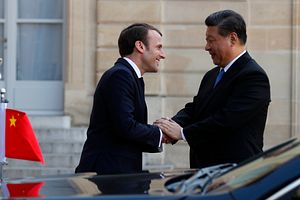A month after Chinese President Xi Jinping’s whirlwind European visit, Sino-French cultural ties are again on display. The 14th annual Croisement Festival opened April 26 in Beijing and runs through July 6, with various art, music, and theater activities and exhibits put on across more than 35 Chinese cities. Cultural affinity between the two is undeniable. France is the top European tourist market for Chinese travelers, attracting around 2 million visitors from China in 2017, a number that is expected to continue on an upward trajectory. Many of these tourists are also avid consumers, flocking to France’s luxury stores. France’s national rail service even launched a Mandarin language WeChat channel in March.
This year’s cultural festival also highlights the 55 anniversary of the establishment of diplomatic relations between Beijing and Paris. While cultural connections are to be showcased over the summer, the first months of 2019 have not been as smooth for the two countries.
The France-China bilateral is important not only in its own right but also within the context of the broader China-European Union relationship. Just over six months into his presidency, France’s Emmanuel Macron vowed to take “the Europe-China partnership into the 21st century” on a state visit to China in January 2018. This pledge is representative of Macron’s bid to reposition France at the center of Europe. More recently, Macron’s commitment to strengthening Europe was visible upon the France leg of Xi’s recent European tour, where the Chinese leader faced a united European front, meeting not only with Macron but also with Germany’s Angela Merkel and the European Commission’s Jean-Claude Juncker. The three European leaders spoke of the importance of the relationship, while also pushing China to address unfair trade practices, restricted market access, transparency, and human rights issues.
Macron in particular has been increasingly vocal about facing up to China. “The time of European naïveté is ended,” Macron said in March. “For many years we had an uncoordinated approach and China took advantage of our divisions.” Separately, while acknowledging China as a great world power, he cautioned that China’s financing and investment practices could be risky, especially in Africa, saying “what can look good in the short term … can often end up being bad over the medium to long term.”
France under Macron has taken on a bolder approach to foreign policy in general, looking beyond Europe to Africa, as well as Asia. Building and deepening partnerships in parts of Africa where China’s influence is growing and with countries in Oceania and China’s neighborhood may not be helping France’s cause in Beijing, especially as it takes a more hawkish position on Xi’s signature Belt and Road Initiative.
Though Paris’ reorientation toward the Asia-Pacific region was already underway before Macron’s 2017 election, the French president has become a vocal advocate for strengthening economic and security ties across the “Indo-Pacific axis.” France has also translated its rhetoric into deals with other actors, including Japan, India, and Vietnam, to deepen defense cooperation. These expanding ties are likely to exacerbate Chinese anxiety about extraregional actors forging partnerships with Asian countries that have by and large been among the most willing to speak out against China’s growing assertive behavior. An odd April reprimand by China’s Ministry of Defense, later scrubbed out of transcripts, of a routine passage by a French naval vessel through the Taiwan Strait suggests possible frustration with a greater French presence in areas where China has vested interests.
China may well be displeased by France’s international outreach. Even the European Commission’s nuanced view of China as simultaneously a cooperation and negotiating partner, an economic competitor, and a systemic rival presumably stings for Beijing. However, the economic dimension of China-France and China-EU relations will likely be the glue that keeps these ties from fraying.
The European Union is China’s largest trade partner, while China is the bloc’s second most important trade partner after the United States. Two-way trade between the EU bloc and China has climbed to 1.5 billion euros a day. The high value of trade was reinforced in late March when Paris and Beijing signed deals worth 40 billion euros, including the sale of 300 Airbus planes and a contract from France’s EDF Group for an offshore wind farm in China. Despite European divisions and the challenge of coordinating interests across the more than two dozen member states, maintaining stability in ties between Paris, Brussels, and Beijing is very much in China’s interest, especially as tensions between Washington and Beijing continue to simmer.
































